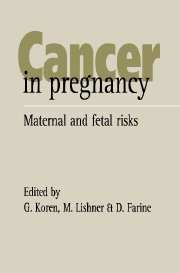Preface
Published online by Cambridge University Press: 06 July 2010
Summary
Cancer is the second leading cause of death in women during the reproductive years, and its occurrence in pregnancy is between 0.07% and 0.1%.
The relative rare occurrence of cancer during pregnancy precludes the conduct of large prospective studies to examine diagnostic, management and outcome issues. However, when cancer occurs during gestation, it creates immense pressure on the pregnant patient, her family and her physicians. The urge to use the highest tolerable doses of chemotherapy, high doses of irradiation and surgery have to be carefully weighted against their potential risks to the unborn baby. This often may result in maternal fetal conflicts.
In order for the woman and her family to arrive at the optimal personal decision, which will drive the medical management, one has to ensure that the family is optimally informed. This is extremely difficult when information is sparse or missing, as is the case in many forms of cancer in pregnancy.
Since the inception of the Motherisk Program in 1985, we have become painfully aware of the lack of data to guide the difficult decisions surrounding the management of cancer in pregnancy. To try to address this unacceptable gap, we commenced our case control studies using the Princess Margaret Hospital database which had accumulated in its thirty years of existence over 300 cases of cancer in pregnancy.
In parallel lines of investigation we have also attempted to critically review the world experience on issues such as irradiation of cancer chemotherapy, as well as using in vitro models to study the role of the placenta in fetal carcinogenesis.
- Type
- Chapter
- Information
- Cancer in PregnancyMaternal and Fetal Risks, pp. ix - xPublisher: Cambridge University PressPrint publication year: 1996



